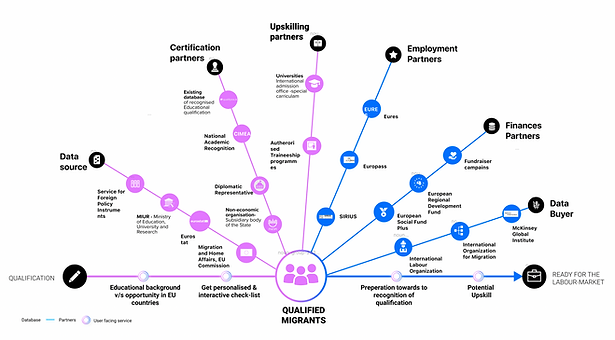Client Name
Politecnico
di Milano
Methodologies
Service Design
Co-design
Research
Year
2021
Deliverables
Service system proposal
Experience prototype video
Blink is an ecosystem built by bringing all the actors responsible for skill recognition in EU to empower migrants with customised information. It can recognise the skill demand, find the right path for validation, have ai driven support to encourage migrants enter the EU labour market and the growing economy.
The course was held in collaboration with the Conference of the Future of Europe, a digital platform that allows European citizens to upload proposals and ideas and solutions that can be seen as concrete recommendations for European action, in order to foster new forms of direct citizen involvement in policy-making and political participation. The brief asked to design a service solution within one of the nine topics of the conference.
Process

Research
At first we familiarised ourselves with types of migration happens to EU and the policies around integration of the migrants. We also took a closer look into the numbers, the sounthern countries such as Spain, Greece and Italy has seen a steep rise in the number of migrants that has brought in a huge unemployment issue. The Norther countries are not too keen on migration hence they have much stronger rules that can rather control the movement. Germany, Netherlands see migration as an opportunity. A federal government agency calculated that about 80% of refugees had a qualified job in their country of origin, but at the moment only 52% of them have found one in Germany.
In the European Commission's Index of Digitisation of the Economy and Society DESI 2020, Italy ranks 25th out of 28 EU Member States The Italian score is 9 points lower than the EU average. The data below provides a clear perspective on the situation.

Migration has a few misconceptions attached to it due to a lack of information. Migration can help the ageing European population grow younger, help the European job market thrive, and improve its economy. The biggest gap triggering the unemployment rate is ineffective policy implementation.
The desk research was complemented by an analysis of case studies that showed particularly interesting examples o of NGOs trying to help migrants by supporting them with language and other skill based courses, mentorship programmes and uniques ways of building a supportive community. The type of programmes differ from country to country.
Expert Interviews
We conducted two expert interview to deepen the research.

Emilio Santoro
Philosopher of Law
Collaborator of General Management for Social Inclusion for European Union

Diana Pamela Villa Alvarez
Design Researcher
User Experience Designer
"It should be part of humans rights to have countries to help you integrate and this means that they should help you enter in the job market. That doesn’t mean that they should suggest you “rejected jobs” and that they have to be sure that they won’t be exploited”
"During my research I repeatedly saw people struggling to know what opportunities are available in the market where their skills resonate and they feel passionate working.”
How might we foster an effective system of mobilising skilled migrants into the EU labour market doing skill-appropriate work?
Co-design

In order to further develop the concept, and understand the challenges our service could possibly face, a series of co-design sessions were held to co-create the service with users (graduates) and experts of our field of work. Each session helped to iterate the concept and finalize the offering in order to fulfil at best the needs and aspirations of migrants ready to use their skills into the labour market.
1. Co-design with users - concept 1.0 | Online
Insight: our concept revolved around setting up a phygital community of ex-pats helping the newcomers to help find a direction and support in order to apply for jobs. The first co-design session validated it.
2. Co-design with users - concept 2.0 | In presense
Insight: The aim of this session was to design the dream mentorship programme. The participants are all graduates from EU universities and now hunting for jobs. The users came to realise that they have their own mentors and it is certainly easy to connect with people and seek help. The bigger issue is inaccessibility to the support the EU offers.
3. Co-design with Experts - concept 3.0 | Online
Insight: We had amazing participants who brought in the following perspectives - bureaucracy, migrant capacity building and hiring practices. The aim was to build a journey with the experts for the migrants approaching the job-market. This session raised a concern i.e. everyone's backgrounds are different as well as each country has a different requirements and needs. What was needed was an aggregator of personalised experience and information!
Results

Blink is an ecosystem that is made built by bringing all the actors responsible for skill recognition in EU to empower migrants with customised information.
We visualised the service through various maps and matrix that portrays the relationship between different stakeholders involved, additionally what and how is being offered to the users.

Offering map
Defining the range of product/service offerings for its users!
Generic offerings and personalised offering!

Stakeholder map
Critically positioning the range of stakeholders needed for the service to be feasible and sustainable.
What each stakeholder brings!

Stakeholder motivation matrix
This matrix showcases the motivation of each actor in the system for partnering with us. It also provides a clear understanding of what they can gain from each-other.
Why each stakeholder brings what they brings!

System-map
This map focuses on the relationship between each stakeholder in the system in terms of the service output and resource-based requirements.
What is the system-flow is like!
Blink, the product!

Blink Concept video
User Journey Map
Please click on the map to have a detailed look

Rapid prototyping
Please click on the map to have a detailed look


